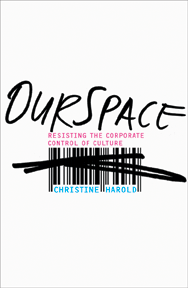Last night Creative Commons celebrated its fifth birthday with an excellent party in San Francisco and several announcements. Due to the difficult acoustics situation in the venue, I was unable to hear just what Prof. Lessig was saying most of the time, and there don’t seem to be announcements on his blog or the CC website yet, so I hope I get this right – please check those sites soon for more authoritative information. (Meanwhile, here is another partygoer’s post, far more detailed than mine.)
- CC met and exceeded its goal of raising half a million dollars in individual donations by Dec. 31. It’s also just raised a massive amount of funding from other sources, as covered in the above-linked SocialMedia post. Congrats!
- CC is starting a Legal Commons (Beta), to debut on Jan. 15, with some sort of affiliation with Carl Malamud of
public.resource.org. The gist of the announcement seemed to be that all federal cases will be publicly accessible (dating back to when, I’m not sure). This is excellent news for those of us in the legal community, and, as a friend of mine commented, “It raises a big middle finger pointed directly at Eagan, Minnesota” (home of Thomson West, i.e. Westlaw). As the open access journal movement continues to gain steam, law journals that want to go open access – and their readers – will benefit from open resources such as public.resource.org, Altlaw, and the forthcoming Legal Commons, as they provide alternative/parallel citations to Westlaw and Lexis/Nexis. Much of the value of a law journal article is in the citations, so readers can now follow up on a citation even if they don’t have (cheap/free) access to Westlaw or Lexis.
- There are going to be new CC licensing options: CC+, which adds more rights than any CC license currently offers; and CC-0 [zero], which allows a creator to waive all rights over her work and to authenticate that waiver with a signature, in a machine-readable way. I’m not sure what the details of the CC+ license are and I hope I’m getting CC-0 right. I was not able to ask Prof. Lessig what is probably a question that has already been answered, or for which he would have a ready, detailed answer (as he usually does when asked pretty much anything, from “Hey, should privacy rights be alienable?” to questions about unladen swallows’ airspeed). My question is, What about the analog hole? This has surely come up in the context of existing CC licenses. If CC-licensed (or CC-0 rights-waived) content jumps offline, doesn’t the machine-readable license tethered to that content by a bunch of ones and zeroes become useless? Does it become, to borrow a loaded word, orphaned? I should investigate this on my own, but I address it to the Lazyweb here in the hopes that people whose minds don’t get easily distracted by DJ Spooky and chocolate cake (man that was a great party) will weigh in.
Happy birthday, CC!
UPDATE: Aha, Lessig has
blogged about the party, the money, and the new licenses. Among the various clarifications of my mealy-mouthed interpretation of his announcements Saturday, Lessig says
all federal case law will be free by about this time next year. Tasty.
 Starting June 9th I will be working at Creative Commons as their summer legal intern. This is an amazing opportunity for me. I will be working under the new General Council Diane Peters. I will be blogging about the experience here and at the Seattle University Law PILF summer journal. I am excited about getting more hands on experience with the CC licenses and meeting more of the Copyright 2.0 community and the Free Culture community. This will be a busy and exciting summer.
Starting June 9th I will be working at Creative Commons as their summer legal intern. This is an amazing opportunity for me. I will be working under the new General Council Diane Peters. I will be blogging about the experience here and at the Seattle University Law PILF summer journal. I am excited about getting more hands on experience with the CC licenses and meeting more of the Copyright 2.0 community and the Free Culture community. This will be a busy and exciting summer. 





